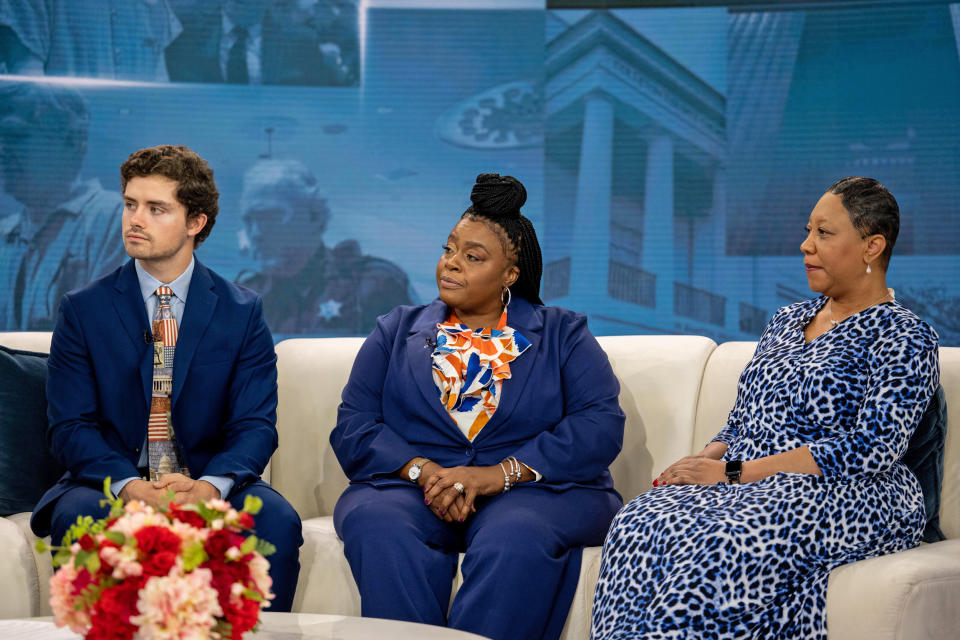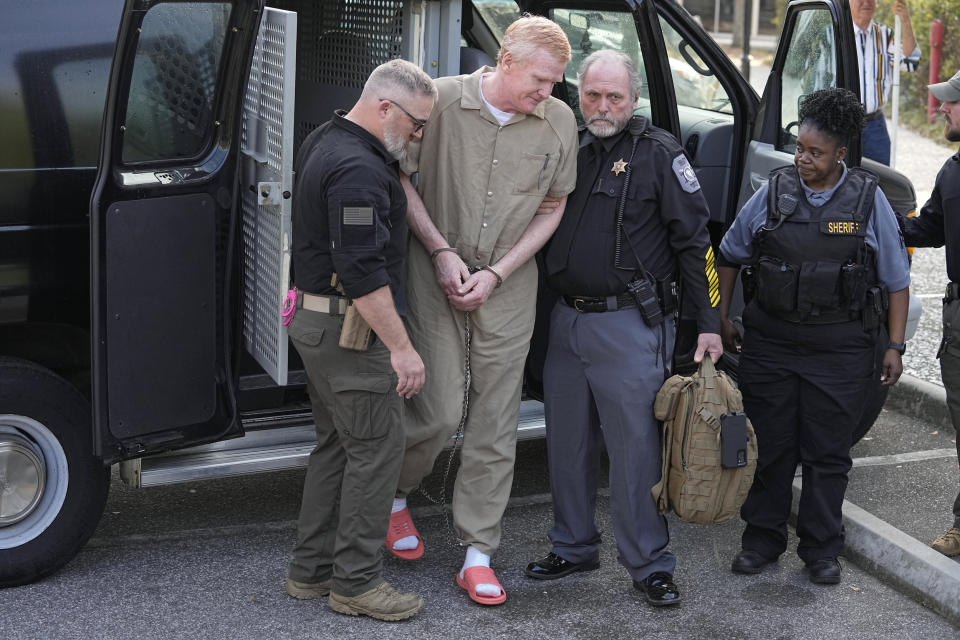Alex Murdaugh jurors speak out on TODAY show : "I didn't think he was crying"
Three jurors in the high-profile double murder trial of Alex Murdaugh said Monday that they don't believe he should have taken the stand in his defense and that his emotions during his two days of testimony appeared manufactured.
"No, I didn't think he was crying. He turned it on and off," juror Gwen Generette said in a live interview on NBC's "TODAY" show.
"No, it wasn't genuine," she added.
"We already know that he's a lawyer," juror James McDowell said of Murdaugh. "He's able to be emotional with cases. He's able to be emotional with himself. I think we were able to read right through that."
Another juror, Amie Williams, said Murdaugh "didn't help himself" by testifying.

Murdaugh, 54, was sentenced Friday to two consecutive life terms for murdering his wife, Margaret, 52, and their son Paul, 22, in June 2021.
After a roughly six-week trial in which 75 witnesses were called, including Murdaugh, the 12-member jury took less than three hours to deliberate and find Murdaugh, a personal injury lawyer, guilty in the fatal shootings at the family's rural estate in Colleton County.
At the onset of deliberations, the jurors took an anonymous poll to see where they stood: Nine said Murdaugh was guilty, two said not guilty, and one was undecided. But after they talked through their concerns, all decided to convict him.
The key piece of evidence was a video taken from Paul's cellphone in the moments before the killings that helped to prove Murdaugh was there, Generette said.
"I think it probably would have been a hung jury had it not been for that video. It's like he spoke from the grave," Generette said of Paul.
During Murdaugh's sentencing, South Carolina Circuit Court Judge Clifton Newman condemned him for his lack of remorse and said the former lawyer would have to reckon with his conscience and the "monster you've become."
The trial had drawn intense interest in a region of South Carolina known as the Lowcountry, where three generations of Murdaugh patriarchs had been elected top prosecutors spanning a consecutive 87 years. The family's fingerprints have been on countless cases tied to the legal system in the Lowcountry, and Murdaugh had also been a part-time prosecutor who took part in trials in the same courtroom where he would be convicted.
It was a bizarre series of events, including a roadside shooting three months after the murders in which authorities said Murdaugh sought to have himself killed, that placed attention back on him as the prime suspect in the slayings.
With the Murdaugh name so recognizable and the case already grabbing headlines and becoming the focus of true crime docuseries and podcasts, court officials had mailed out an astounding 900 jury summonses in Colleton County, home to about 38,600 people.
The jurors were not allowed to take notes during the trial, but they could use notepads to jot down questions when they returned to the jury room during breaks.
Before deliberations began, Newman allowed the jurors to tour the scene of the crime — the family's sprawling estate known as Moselle, where Margaret and Paul were shot multiple times near the outdoor kennels and a feed room.
Williams said that was beneficial in helping her come to her decision and understanding the distances between places explained during testimony.
"I wanted to see how big that feed room was. It was very tiny in person," she said. "I also wanted to see if you could see down there to the feed room, the kennels from the house, and you could."

Prosecutors with the state attorney general's office did not present hard evidence, such as a confession or security video, that Murdaugh fired the guns used in the killings, and said investigators had not located the weapons. Instead, their case against him was built primarily on circumstantial evidence and the premise that he had the motive, means and opportunity to kill his family.
Prosecutors allege that, for years, Murdaugh had schemed and stolen about $8.5 million from more than a dozen victims, including through his family's law firm and from clients. On the day of the murders, the chief financial officer of the firm testified, she had confronted Murdaugh about $792,000 in missing client settlement funds. But after the killings, she said, she halted her investigation.
Paul was struck twice with a shotgun before Margaret was shot multiple times with an AR-style rifle, according to investigators.
Murdaugh denied to investigators that he had been at the kennels that night and said the last time he saw his family was earlier in the evening at dinner and that he took a short nap before visiting his ailing mother, who has Alzheimer's disease.
The prosecution, however, played video taken from Paul's cellphone at the kennels at 8:44 p.m. to cast doubt on Murdaugh's alibi. Three voices could be heard in the video speaking, and several of the state's witnesses identified the voices as belonging to Paul, Margaret and Murdaugh.
In response, Murdaugh was called to the stand by his lawyers and said he had lied multiple times to investigators, admitting that he was dishonest about his location before the murders because of his longtime addiction to prescription pain pills and his general paranoia.
During closing arguments, lead prosecutor Creighton Waters seized on his change of story to question Murdaugh's credibility and proclaim he orchestrated an alibi.
"Why would he lie about that, ladies and gentlemen," he asked the jury. "Why would he even think to lie about that if he was an innocent man?"
Defense lawyer Jim Griffin reiterated that Murdaugh had lied about his actions and his addiction to pain pills, but called the prosecution's motive that he killed his wife and son because he was under financial pressure and about to be exposed for swindling money from his family's law firm an "illogical" theory.
But the three jurors said Monday that Murdaugh's testimony and the revelation that his voice was in the video from the kennels worked against him.
"I realized it was him in the kennel video, that just kind of sealed the deal," Generette said.
The detailing of Murdaugh's financial crimes throughout the trial was also critical in the case against him.
"We could only consider it as part of the motive," Williams said. "It helped in showing that he was very convincing and manipulative. And so it made sense" to include it into evidence.
"I don't think we'll ever know" why Murdaugh killed his wife and son, she added.
Generette said Murdaugh's need to influence people to his advantage played a role.
"He wanted to have control of everything," she said. "I'm thinking it was more like greed."
After his sentencing Friday, Murdaugh was transported to a state prison in Columbia for medical and mental health evaluations. He will eventually be assigned to a specific custody level and placed in one of the state's maximum-security prisons for inmates serving life sentences.
Apart from the murder charges, Murdaugh still faces 99 charges related to financial crimes. His defense attorneys said last week they plan to appeal the double murder conviction.
McDowell and other jurors said it was important to be in the courtroom for Murdaugh's sentencing Friday.
"We spent six weeks there. We bond. We're a very close-knit jury in that point in time," McDowell said. "It was very important to see it to the end."
The jurors also explained one of the lighter moments at the end of the trial, when Newman dismissed a juror for improper conversations about the case outside the courtroom. Newman had asked her whether she needed to take anything with her, and she responded that she had a dozen eggs in a back room.
The jurors said on "TODAY" that the dismissed juror had about three dozen brown eggs to give away to everyone. They laughed and agreed that it showed they had become a family and made "new friends for life."
This article was originally published on NBCNews.com

